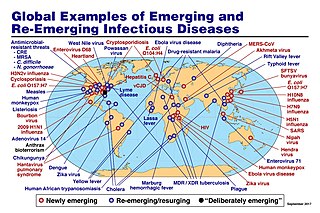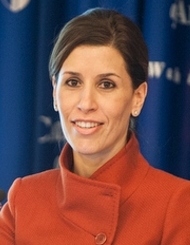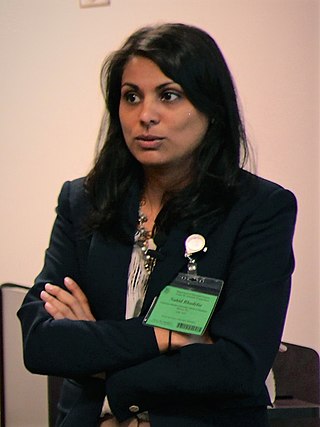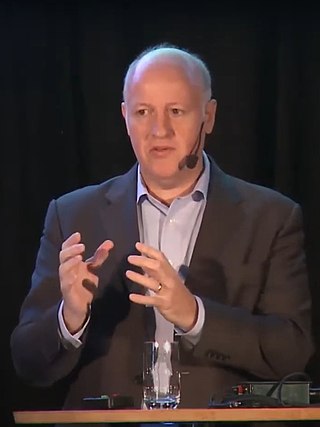Related Research Articles

Bioterrorism is terrorism involving the intentional release or dissemination of biological agents. These agents include bacteria,viruses,insects,fungi,and/or their toxins,and may be in a naturally occurring or a human-modified form,in much the same way as in biological warfare. Further,modern agribusiness is vulnerable to anti-agricultural attacks by terrorists,and such attacks can seriously damage economy as well as consumer confidence. The latter destructive activity is called agrobioterrorism and is a subtype of agro-terrorism.

An emerging infectious disease (EID) is an infectious disease whose incidence has increased recently,and could increase in the near future. The minority that are capable of developing efficient transmission between humans can become major public and global concerns as potential causes of epidemics or pandemics. Their many impacts can be economic and societal,as well as clinical. EIDs have been increasing steadily since at least 1940.
The Center for Infectious Disease Research and Policy (CIDRAP) is a center within the University of Minnesota that focuses on addressing public health preparedness and emerging infectious disease response. It was founded in 2001 by Dr. Michael Osterholm,in order to "prevent illness and death from infectious diseases through epidemiological research and rapid translation of scientific information into real-world practical applications and solutions". It is not part of the Center for Disease Control or National Institute of Health.

Luciana Borio is a Brazilian-American infectious disease physician and public health administrator. She is a vice president at In-Q-Tel. She previously served as director for Medical and Biodefense Preparedness at the National Security Council,acting chief scientist of the U.S. Food and Drug Administration (FDA),assistant commissioner for counterterrorism policy of the FDA,and director of FDA's Office of Counterterrorism and Emerging Threats. She is known for her work advancing clinical trials,the development of medical countermeasures for health emergencies,and the public health responses to Ebola and Zika outbreaks.

A public health emergency of international concern is a formal declaration by the World Health Organization (WHO) of "an extraordinary event which is determined to constitute a public health risk to other States through the international spread of disease and to potentially require a coordinated international response",formulated when a situation arises that is "serious,sudden,unusual,or unexpected",which "carries implications for public health beyond the affected state's national border" and "may require immediate international action". Under the 2005 International Health Regulations (IHR),states have a legal duty to respond promptly to a PHEIC. The declaration is publicized by an IHR Emergency Committee (EC) of international experts,which was developed following the 2002–2004 SARS outbreak.

Deadliest Enemy:Our War Against Killer Germs is a non-fiction book by epidemiologist Michael T. Osterholm and writer Mark Olshaker,that explores public health emergencies including antimicrobial resistance,emerging infectious disease,and the threat of an influenza pandemic. It proposes a nine-point "battle plan for survival" for dealing with these threats,including solutions to antimicrobial drug resistance.

Sir Christopher John MacRae Whitty is a British epidemiologist,serving as Chief Medical Officer for England and Chief Medical Adviser to the UK Government since 2019.
Dr. Daniel R. Lucey is an American physician,researcher,clinical professor of medicine of infectious diseases at Geisel School of Medicine at Dartmouth,and a research associate in anthropology at the Smithsonian National Museum of Natural History,where he has co-organised an exhibition on eight viral outbreaks.
Jennifer Nuzzo is an American epidemiologist. She is Director of the Pandemic Center and Professor of Epidemiology at the Brown University School of Public Health,having previously taught at the Johns Hopkins Bloomberg School of Public Health. She is also a Senior Fellow for Global Health at the Council on Foreign Relations.

Neil Morris Ferguson is a British epidemiologist and professor of mathematical biology,who specialises in the patterns of spread of infectious disease in humans and animals. He is the director of the Jameel Institute,and of the MRC Centre for Global Infectious Disease Analysis,and head of the Department of Infectious Disease Epidemiology in the School of Public Health and Vice-Dean for Academic Development in the Faculty of Medicine,all at Imperial College London.

Syra Madad is an American pathogen preparedness expert and infectious disease epidemiologist. Madad is the Senior Director of the System-wide Special Pathogens Program at NYC Health + Hospitals where she is part of the executive leadership team which oversees New York City's response to the Coronavirus disease 2019 pandemic in the city's 11 public hospitals. She was featured in the Netflix documentary series Pandemic:How to Prevent an Outbreak and the Discovery Channel documentary The Vaccine:Conquering COVID.

Michael Joseph Ryan is an Irish epidemiologist and former trauma surgeon,specialising in infectious disease and public health. He is executive director of the World Health Organization's Health Emergencies Programme,leading the team responsible for the international containment and treatment of COVID-19. Ryan has held leadership positions and has worked on various outbreak response teams in the field to eradicate the spread of diseases including bacillary dysentery,cholera,Crimean–Congo hemorrhagic fever,Ebola,Marburg virus disease,measles,meningitis,relapsing fever,Rift Valley fever,SARS,and Shigellosis.

Bruce Aylward is a Canadian physician and epidemiologist. Since September 2017 he has been Senior Advisor to the Director-General of the World Health Organization. He is part of the implementation of the WHO's COVAX Facility. He has past experience in the areas of polio eradication,Zika virus,and Ebola.

Nahid Bhadelia is an American infectious-diseases physician,founding director of the Center for Emerging Infectious Diseases Policy and Research (CEID) at Boston University,and an associate professor at the Boston University School of Medicine. She served as the Senior Policy Advisor for Global COVID-19 Response on the White House COVID-19 Response Team.

Caitlin M. Rivers is an American epidemiologist who as Senior Scholar at the Johns Hopkins Center for Health Security and assistant professor at the Johns Hopkins Bloomberg School of Public Health,specializing on improving epidemic preparedness. Rivers is currently working on the American response to the COVID-19 pandemic with a focus on the incorporation of infectious disease modeling and forecasting into public health decision making.
Alexandra Louise Phelan is an associate professor at Johns Hopkins Bloomberg School of Public Health and senior scholar at the Johns Hopkins Center for Health Security. She specializes in international legal and policy issues that are related to emerging and reemerging infectious diseases,including upstream drivers of disease emergence like climate change.
Colleen S. Kraft is an infectious disease physician,associate professor in the Department of Pathology and Laboratory Medicine,and the director of the Clinical Virology Research Laboratory at Emory University School of Medicine. In 2014,she led Emory University Hospital's effort to treat and care for Ebola virus disease patients and is currently working to address the COVID-19 pandemic in Georgia. She currently serves on Georgia's COVID-19 task force.

Peter Daszak is a British zoologist,consultant and public expert on disease ecology,in particular on zoonosis. He is the president of EcoHealth Alliance,a nonprofit non-governmental organization that supports various programs on global health and pandemic prevention. He is also a member of the Center for Infection and Immunity at the Columbia University Mailman School of Public Health. He lives in Suffern,New York.
Crystal Watson is a senior scholar at the Johns Hopkins Center for Health Security and an associate professor in the Department of Environmental Health and Engineering. She is an expert in health security,biodefense,and risk assessment and preparedness for emerging infectious diseases. She is currently working on the public health response to the COVID-19 pandemic.
Natalie E. Dean is an American biostatistician specializing in infectious disease epidemiology. Dean is currently an assistant professor of Biostatistics at the University of Florida. Her research involves epidemiological modeling of outbreaks,including Ebola,Zika and COVID-19.
References
- ↑ "Amesh Adalja". University of Pittsburgh. Archived from the original on 2021-09-20. Retrieved 2021-09-30.
- 1 2 3 Guggenheimer, Paul (March 9, 2021). "Pittsburgh-based Dr. Amesh Adalja cherishes role as voice of the pandemic". Pittsburgh Tribune. Retrieved August 5, 2021.
- ↑ Friel, Tyler (February 9, 2021). "Butler Native Dr. Adalja Becomes Reliable Voice On COVID-19 Pandemic". Butler Radio. Retrieved August 5, 2021.
- ↑ "My Kind of Medicine: Real Lives of Practicing Internists". American College of Physicians. August 2016. Retrieved August 6, 2021.
- ↑ Carpenter, Mackenzie (October 25, 2014). "Pittsburgh Ebola expert Amesh Adalja in demand all over the world". Pittsburgh Post-Gazette. Retrieved August 6, 2021.
- ↑ "About Clade X, a tabletop exercise". Johns Hopkins Center for Health Security. Archived from the original on 2021-04-14. Retrieved 2022-04-12.
- ↑ "Amesh Adalja, MD". Johns Hopkins University. Retrieved August 6, 2021.
- ↑ Satyanarayana, Megha (February 9, 2017). "The doctor is in: 13 clinicians to follow on Twitter". Stat News. Retrieved August 6, 2021.
- ↑ Dutt, Ela (March 10, 2020). "Voice of Reason: Leading Indian-American expert on Infectious Diseases speaks to Coronavirus fears". News India Times. Retrieved August 5, 2021.
- ↑ "Amesh Adalja, MD, FIDSA". Johns Hopkins University. Retrieved August 5, 2021.
- ↑ "Biggest influencers in infectious diseases in Q1 2021: The top individuals to follow". May 12, 2021. Retrieved August 6, 2021.
- ↑ Peikoff, Kira (March 6, 2020). "The Best Coronavirus Experts to Follow on Twitter". Leaps. Retrieved August 6, 2021.
- ↑ Guggenheimer, Paul (November 13, 2021). "Pittsburgh doctor on pandemic: 'We will be living with this virus, there is no covid zero'". Pittsburgh Tribune-Review . Retrieved November 14, 2021.
- ↑ Adalja, Amesh (November 11, 2021). "Changing how we think about COVID: We should look for off-ramps from universal masking and other mitigation measures". New York Daily News . Retrieved November 14, 2021.